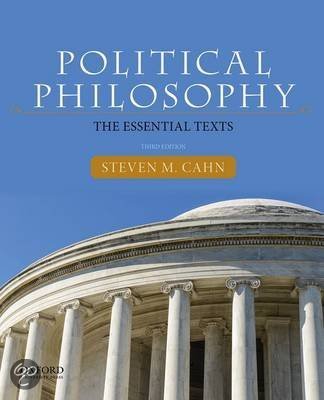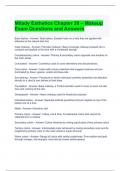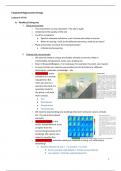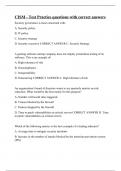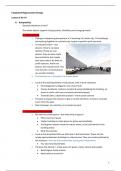CHRISTIANITY
1. Creation is good: world created by God and it’s good. Nature, existence is good.
Creation is beautiful and it’s good that things exist. Every new life is welcomed.
Hence not allowed to kill innocents, respect nature and environment.
2. Fall (of men/Adam): Men has fallen in sin, rebellion against God. Become
disobedient. This is a sin, brought evil in the world, leads to all kinds of suffering,
deaths etc. If there’s sin & real evil, politics has to combat in.
3. Redemption: grace, faith. Passion of the Christ. Christ (God) has come down to the
world to save the people. People who have faith in Christ will be saved.
4. Renewal: heavenly city. Fallen and corrupted nature will be renewed, new
Jerusalem/paradise where everything will be restored again.
After first/second century Western civilization not only based on Greeks & Romans, but
Christian religion.
R. Brague: Europe become powerful & important because Europeans have always tried to
find wisdom in world outside themselves. Explore in other areas. (conquered parts of the
world). Europe has been outgoing across the globe. Looking for roots beyonds themselves
than only Athene’s and Jerusalem.
AUGUSTINE
- 354-430
- Born North-Africa, went to Italy and then back
- Rhetorician (public speaker) → theologian → bishop
Good at giving speeches, arguing. Appointed chief rhetorician of the city of Rome. Went
through emotional crisis and looked for more. Went to several vague and extreme traditions
to find the truth.
In the end turned to theology. Became knowledgeable in that area. Wrote a lot
(books/letters), engaged in debates etc.
Main works Augustine:
- Confessions → autobiography about his life. Writes about own doubts, questions.
Questions time. Very reflective and personal book.
- De Civitate Dei → political book
- when looked for wisdom, he went to several traditions:
- Manichaeism: two forces, one good one evil. Good and evil fighting each
other, God vs. devil. Equal in strength. Came to conclusion that God, the
good, is stronger. Then turned to (neo) Platonism.
- (neo) Platonism: attracted because of reason ruling the world. Base our
actions on that. Also became critical against is. Why? Because platonists
were sceptics. Real truth not accessible to us. World of appearances not the
real world, veil over truth, and truth hiding behind it. Human kind will never be
able to find real truth. Augustine didn’t agree. Believed truth was accessible.
Wrote Contra Academicos
, - Contra Academicos: claiming that truth is accessible.
DE CIVITATE DEI
- 410 sack of Rome. Barbarians conquered it and burned it down. Shocking to
Agustine, Rome was the capital of the world, had a high culture, trade etc. But still,
plucked and sacked by these barbarians. Shocking event to all people including
Augustine. People in Roman empire blaming christians. Because christianity became
big, Roman empire became weaker, therefore not strong enough to defend
themselves. Also accused the christians of helping/cooperating the Visi Goths to
plunder Rome. → Augustine wrote DCD to defend the Christians from this claim.
- Civitas Terrena: city of the earth. Don’t believe in christianity. Also identified with
Roman Empire. World of many (false) Gods. Rome is also symbol of sin. People live
for their money, sex, pleasures and bad things. Abusing good things for bad
pleasures.
- Civitas Dei: city of God. group of people who are real christians, have faith, try to live
holy. Distributed over earthly city. Includes believers that died and are in heaven as
well as the good believers still alive on earth. Church not necessarily same as
heavenly city, because sometimes the church is are also corrupt.
Those two cities are at war with each other. Non-believers hate the believers.
Augustine starts discussing politics on larger scale. In Rome, no justice. Maybe in theory, but
not in practice. It was sinful, honouring of false Gods.
No justice → no people → no res publica (common good).
If there is no justice, people will stand against each other.
- Quote: ‘’remota justitia quid sunt regna nisi magna latrocinia?’’ (IV.4) → if justice is
away what are kingdoms other than criminal gangs? Without justice, kingdom will fall
into a state of criminality. There is no political community without justice. Politics
becomes crime.
- Rome in the end nothing more than gang of robbers. Conquered entire world, stole
wealth of many people.
More fundamental difference between the two cities:
- Love of self (Civitas Terrena) pride, cupiditas). Only love themselves, go for their own
interests. Filled with pride and their own desires/lust are leading (cupiditas).
LIBIDO DOMINANDI: Libido/lust dominates.
- Love of God (Civitas Dei): not self-love, but of good and others, environment.
Humility, humbleness, caritas (charity, love of others)
How will these two groups live together? No war broke out, so how did they live together?
Puzzle for Augustine.
- both have one common object of love which is Earthly peace. Interest in preventing
civil war by having peace on earth and not kill each other.
- This is the political upshot of his talk, basis on which he builds politics. Because of
sin, rebellion, contrast of two cities, we need government to ensure peace.
JUST WAR THEORY
,Augustine also famous of this.
If peace is the end goal and what human kinds want, why then are there so many wars, and
can we justify wars sometimes? Important question, christians were pacificts: not wanting to
go into wars. Augustine disagreed, developed just war theory.
- War should be avoided, should be the last resort → First try diplomacy, boycotts,
talking etc. War has to be postponed to last instance. Convinced that war is evil and
had to be avoided.
- Sometimes has to be done → Only defensive, against great injustices, for example,
genocide happening somewhere, intervening. This is a just cause.
- War has to be raised by proper authorities and highest authorities within political
community (kings, rulers etc), no private wars.
- With reasonable chance of success → If you know you will lose, don’t go into war.
Spare the lives. If attacked and you can’t win by defending yourself, you shall give
up.
- Use proportionality → Don’t overuse weapons, don’t bomb cities if it’s unnecessary.
Restrained in use of violence and force.
- War should be aimed at peace, should have right intention. Not just punishing others,
conquering entire world. Intention of war maker should be peaceful one.
This tradition of thinking has become really big. Whole tradition of international law thinking
has been built on it.
AQUINAS
1224-1271
Went to Italy, Paris and back
Dominican - scholasticism (tradition of argument)
Scholasticism: worked with method of division and integration. In a form of disputation
(medieval)
Road of disputations
- sub questions
- objections
- sed contra
- ‘I answer that’
- reply to objections
Very careful method. Students in medieval universities used this method.
Wrote the book Summa Theologica.
Two levels of reality:
- Used combination of Aristotle and Augustine. Aristotle is ‘The Philosopher’ (it’s
always aristotle). Other main source is Augustine.
- Natural + supranational level.
- Natural: biology, economics, politics
- Supernatural: faith, religion, spirituality etc.
- Reason + revelation:
- humans have reason and therefore know what goes in in nature (natural
level)
- Revelation helps to understand supranationality (supranational level)
, - Cardinal + theological virtues
- four cardinal virtues: wisdom, justice, temperance & courage
- Aquinas adds 3 more: faith, hope & charity.
‘’Gratia naturam non tollit, sed perficit.’’ → grace does not annul nature but perfects it.
Nature being perfected by grace (god’s influence on people). Grace helps to rise from
natural to supernatural level.
Debate against this: against the power of sin ‘natural religion’, etc → by protestants.
FOUR TYPES OF LAW
- God vs. sin. Law is needed because of sin, God supreme leader. Eternal law of God,
His big plan of the world. This plan not known to human kinds. However, parts of
eternal law can be known. This is → natural law.
- Natural law: for instance, do good and not evil. Love and do not hate. We know this
by our own reason, because it’s written on our hearts. These are general things.
More precise? Specific things of how to live… Natural law falls into two.
- First principles (do good, love and no hate etc.)
- Secondary principle (derived of first): harder to grasp. Things that have to be
instructed to the humans. This leads to… human law
- Human law (derived from natural law). All the good law that has to be obeyed derived
from natural law, otherwise it’s not law. Example: Martin L. King letter to Birmingham
jail. Letter to criticize American law of discrimination. American law is not the natural
law.
Human reason can be weak. God has given additional help to people in order to let know
what he wants. This is…
- Revelation: Divine Law. This should be basis of human law.
CHURCH/STATE
Two swords: Earthly & Spiritual
Doctrine of two swords (gelasius) of two kingdoms. Temporal power vs. spiritual power. For
example, kings that want to become very powerful. Spiritual power fights this.
Acquinces says: Church and state are distinct yet (hierarchically) related.
However, in the end, church is more powerful than the state → pope and emperor. The
spiritual power gives authority to earthly power, church higher than state in the end.
- No theocracy → church stays out of state
- No neutralism/secularism → state helps to protect religion, not be neutral against it.
Tries to find a middenweg between state and church
CONCLUSION
Poster of Ambrogio Lorenzetti (Siene, 1339).
We see king of Sienna in middle. Another throne with woman called Justice. Above her,
wisdom telling her what to do. Justice giving sanctions and advice to both parties.
Concordia: unity of city of Siena. All citizens, using a rope. People are one.
Throne with the king surrounded by virtues. Laying woman is called Pax (peace). Well
ordered government preserves peace. She is surrounded by cardinal virtues (courage,


